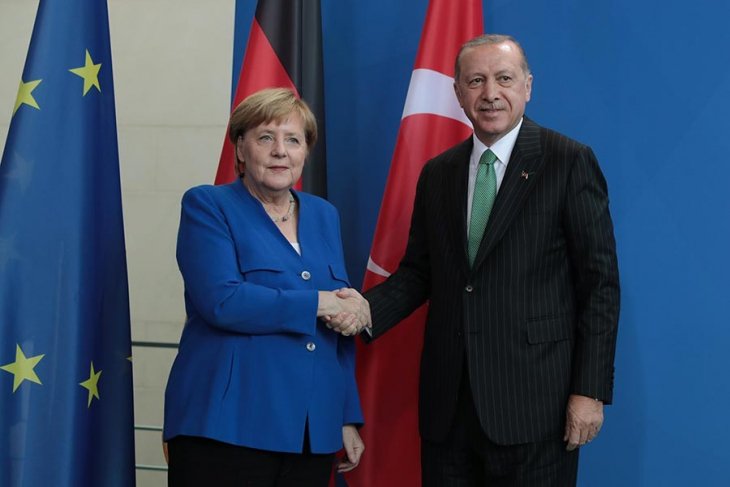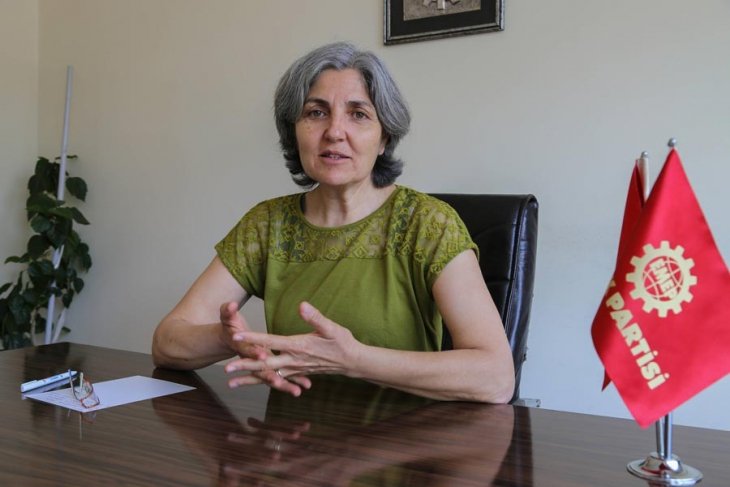One of President Tayyip Erdoğan’s priority objectives of the visit to Germany is to attract more German investments in Turkey.
Which compromises and commitments took place in Erdogan’s interviews with the German monopolies providing investing more in Turkey?
Getting economic relations back on the track and attracting more German direct investment to Turkey was at the centre of President Erdogan’s visit to Germany last week. During the visit, while Prime Minister Angela Merkel said that there is no direct financial assistance to Turkey, it was stated that meetings are held with German monopolies behind the closed doors to make more investments in Turkey.
In reports in the German media, it was commented that Erdogan’s great concern was the decision German companies investing in Turkey to withdraw or reduce their investment in the country. According to official figures, while 7 thousand 200 German companies operate in Turkey, some of these had previously been targeted by Erdogan. Therefore, Erdogan met with the administrators of monopolies from Turkey especially for “the elimination of insecurity” in Berlin.
Concessions and Commitments from Erdoğan to the Monopolies
While it wasn’t announced which monopolies attended a 1-hour meeting, it was reported in the media that Erdogan made some promises to the concerns of German monopoly executives and promised reforms.
Dieter Kempf, President of the German Industrialists’ Association, who attended the meeting said “We clearly wanted to create the climate necessary for investments” to the press. Among those who organized the gathering of Erdoğan and German employers, Kempf said, “The return to the rule of law, freedom of the press and reforms are among the top. The creation of a democratic structure is inevitable for direct investments.” It is said that Erdogan expressed these promises during the visit to accelerate talks with the EU.
ATTRACTING INVESTMENTS OFFICE ESTABLISHED
Erdogan, whose messages are directed to increase their investments in Turkey by the German monopolies, evaluated this visit positively from this perspective. One of Erdogan’s priority objectives is to attract more German investments in Turkey. For this reason, an office named Invest in Turkey, based in Hamburg was established and Reiner Ptok head of the German Association of Central Business Enterprises (BVMW)was appointed as the director. Soon it is expected to open an office Invest in Turkey in Berlin.
Ptok brought to office in May, stated in his own internet site that 7 thousand German companies and 140 thousand people work in Turkey with a population of 80 million, pointed to the strategic importance that it has between Asia, Europe and Russia. Whether Ptok, whose task is to ensure German monopolies invest more in Turkey, will be successful in the future is not clear yet. Ptok, said in a statement to the daily Die Weltand he summarized the situation “ many German companies follow the developments and Turkey ranks top in the list of countries to be currently invested, but the decisions are postponed, mostly by looking at the developments”.
Previously, a similar agency was founded by Turkey, “Investment Support and Promotion Agency of Turkey” (ISPAT). Hamburg Former Mayor Ole von Beust (CDU), former Economy Ministry Undersecretary Rezzo Schlauch, Germany’s former Ambassador to Ankara Wolf- Ruthart were assigned as administration. However, they did not provide much progress.
GERMAN MONOPOLIES’ PROFIT DID NOT DECREASE IN TURKEY
According to Die Welt newspaper, despite the Turkish Lira crisis, the investments of the German companies in Turkey and their profit have not decreased much compared to past. It is said that Bosch is one of the most established investor monopoly achieved of 1.5 billion euros last year’s total turnover in Turkey. Bosch employs a total of 18 thousand people in Turkey.
Despite all these, it is stated that the growth of Turkey’s economy will not go to the stage quickly in the coming years. Based on a survey conducted by the institution named the Federal Ministry of Economics “German Trade & Invest” (GTA) institutions, it is expected many of the companies will face with bankruptcy and loan interest in Turkey is to rise between 30-40 per cent.
In the first half of this year, the German Machinery Employers’ Association (VDMA) reported that sales of machinery decreased by 6.6 per cent (1.8 billion euros). As long as the Lira crisis continues, the concern that this will continue to decline is dominant. Especially in the construction sector is recession expected. Investment bank J. P. Morgan, they announced that the expected growth rate in Turkey would remain 1.1 per cent in 2019.
The data shows that economic developments in Turkey where Germany’s average annual exports are 20 billion euros are not positive. This also concerns the monopolies that already invest and will invest in the future in this country. Therefore, Erdoğan was clearly given the message that the investments would be increased if the conditions were normalized.
THE MOST IMPORTANT AGENDA OF THE VISIT TO ANKARA IS RAILWAY TENDER
The first important step is the employer weighted delegation visit to Turkey in the leadership of the Federal Economics Minister Peter Altmaier, later this month. The meetings in Berlin are expected to continue in Ankara. The conditions for new investments are expected to be sorted. The most important investment is that Deutsche Bahn will modernize the railway network, and will construct new lines in Turkey in exchange for 35 billion euros.
It was observed in the recent meeting that Germany is the only country that Erdoğan trusts to attract more investors to Turkey, to overcome the insecurity. German monopolies act with the awareness of this, in this difficult period by imposing more severe conditions to make more profit. For this reason, the Turkish-German Economic Forum is being revived. However, the process that Turkey has entered shows that “stability” that the German monopolies want will not come in a short time. Nevertheless, all German monopolies, especially the monopolies of guns, will continue to get more concessions from Erdogan, who has been under an economically difficult period.
CAPITAL ESCAPE TO GERMANY FROM TURKEY
Capital flow towards Germany from Turkey has also increased in recent months due to the economic developments in Turkey. According to a parliamentary question response from the German Free Democratic Party, in Turkey between April and June 4.57 billion euros capital flow took place to Germany from Turkey. The depreciation of the Turkish Lira played a major role in the capital flow. According to the response given by the Federal Ministry of Finance, 400 million euros in the last quarter of to, and 300 million in the first quarter of 2018 capital flows occurred from Turkey. In a statement issued by the government also was expressed that a total of 20 billion euros were given in loans from German banks in Turkey.
Article by: Yücel ÖZDEMİR

